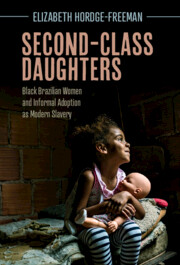Book contents
- Second-Class Daughters
- Afro-Latin America
- Second-Class Daughters
- Copyright page
- Dedication
- Contents
- Figure
- Acknowledgments
- Introduction
- 1 Adopting Modern Slavery
- 2 “Quase da Família” (Almost Family)
- 3 Prisoners of Love
- 4 Depths and Debts of Gratitude
- 5 Family Bonds and Bondage
- 6 Home Sick
- 7 Freedom to “Live Her Own Liberty”
- Conclusion
- Book part
- Works Cited
- Index
5 - Family Bonds and Bondage
Generational Relationships and the Persistence of Criação
Published online by Cambridge University Press: 10 March 2022
- Second-Class Daughters
- Afro-Latin America
- Second-Class Daughters
- Copyright page
- Dedication
- Contents
- Figure
- Acknowledgments
- Introduction
- 1 Adopting Modern Slavery
- 2 “Quase da Família” (Almost Family)
- 3 Prisoners of Love
- 4 Depths and Debts of Gratitude
- 5 Family Bonds and Bondage
- 6 Home Sick
- 7 Freedom to “Live Her Own Liberty”
- Conclusion
- Book part
- Works Cited
- Index
Summary
In Chapter 5, the author examines the role of intimacy between filhas de criação and their biological family members in criação. Challenging misconceptions about criação, she discusses evidence that some filhas de criação run away from their biological homes and to their informally adoptive homes. While, in some cases, filhas de criação are blocked from seeing their biological family members, in many cases, ongoing relationships with their biological families provide the opportunity for siblings to serve as co-conspirators and co-collaborators in each other’s search for freedom and independence. An unexpected finding is also that contact with biological family members may sometimes compel filhas de criação to extend the time that they provide unpaid and exploitative labor to an adoptive family. This chapter reveals the transgressive role that biological siblings can have in the lives of filhas de criação, while also highlighting the capacity for systems of domination to co-opt these same family ties and bonds to secure its proliferation.
- Type
- Chapter
- Information
- Second-Class DaughtersBlack Brazilian Women and Informal Adoption as Modern Slavery, pp. 138 - 160Publisher: Cambridge University PressPrint publication year: 2022

